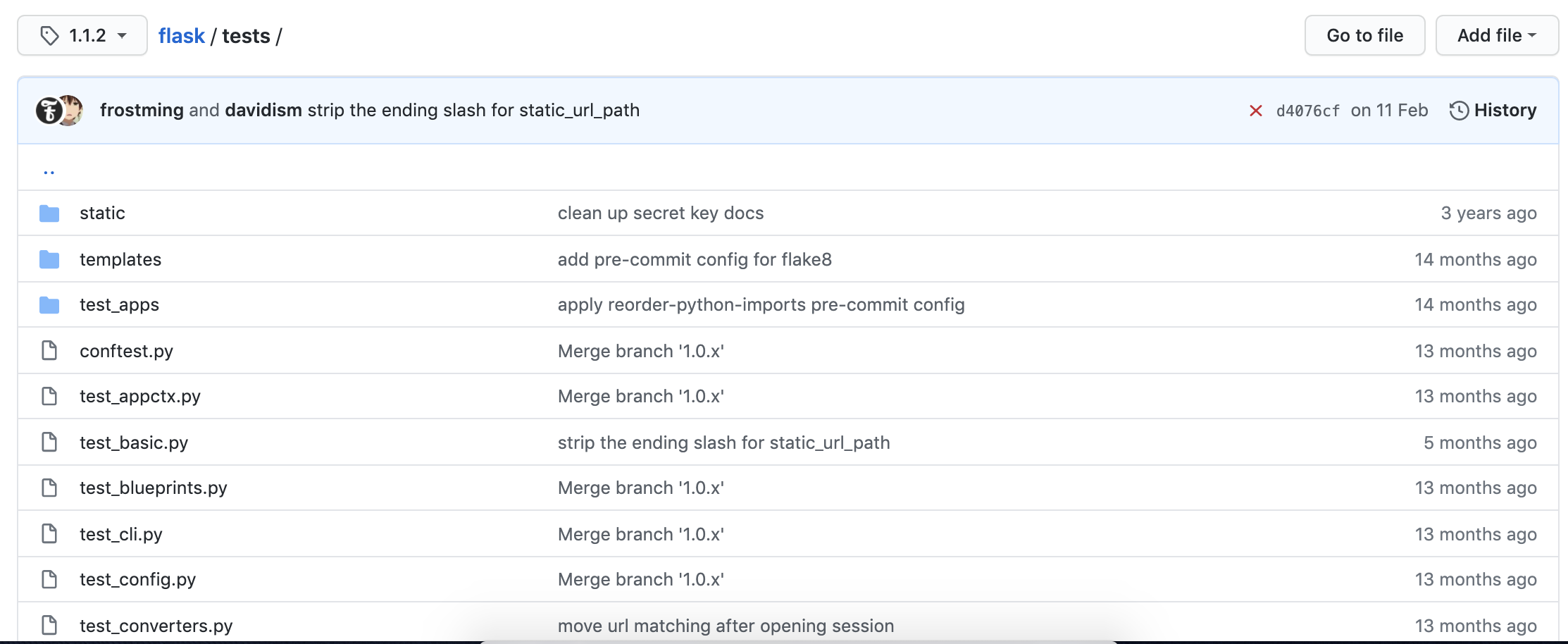출처:
공식 문서, flask 서버에 unittest 적용하기, 깔파탄백 참고한 블로그
공식문서2 + 공식repo
django에서는 unit test의 개념만 이해한다면 테스트를 하는 것이 어렵지 않았다. ORM이 알아서 데이터 부분을 잘 처리해줬기 때문에, 나는 그저 데이터를 만들고 지우기만 하면 됐다.
하지만 flask의 경우 데이터베이스 connection을 직접 하다보니 봤을 때 바로 이해가 가지 않았다. 갓 ORM이 날 위해 뒤에서 뭘 해주고 있었는지 몰랐기 때문에(...) 더 그랬던 것 같다.
우선 깔파탄백을 참고한 블로그를 참고했고, django에서 python 내장 모듈을 사용한 것과 달리 이번에는 pytest를 써보았다.
file 구조
flaks 공식 repo를 보니, 루트에 test 디렉토리를 생성하고, 그 안에 각 앱에 대한 테스트 파일을 작성하도록 되어있었다. unit test를 작성한 파일의 경우 반드시 test로 시작해야 한다. 아래 이미지를 보면 파일 이 다 test 언더바로 시작되는 것을 볼 수 있다.

test database 생성
먼저 안전한 테스트를 위해 테스트 데이터베이스를 생성한다. 데이터베이스 연결 관련 정보를 담은 config.py에 test 유저를 만들고, mysql connector로 테스트 데이터베이스에 연결한다. 여기서 중요한 것은 테스트 데이터베이스가 실제 데이터베이스와 스키마가 동기화되어 있어야 한다는 점이다.
test_db = {
'user': 'test',
'password': '1234',
'host': 'localhost',
'port': 3306,
'database': 'test_db'
}
test_config = {
"DB_URL": f"mysql+mysqlconnector://{test_db['user']}
:{test_db['password']}@{test_db['host']}
:{test_db['port']}
/{test_db['database']}?charset=utf8"
}리턴값 받기
flask에서는 내가 만든 엔드포인트를 테스트할 수 있는 test_client라는 기능을 제공한다. pytest.fixture 데코레이터를 사용하면 해당 엔드포인트를 가지고 있는 함수의 리턴 값을 인자로 넣어주게 된다.
@pytest.fixture
def api():
app = create_app(config.test_config)
app.config['TESTING'] = True # unit test에서 에러를 캐치하기 위해, 예외가 핸들링 되지 않도록 설정해주는 것
api = app.test_client()
return apiYou must set app.testing = True in order for the exceptions to propagate to the test client. Otherwise, the exception will be handled by the application (not visible to the test client) and the only indication of an AssertionError or other exception will be a 500 status code response to the test client.
test
깔파탄백 책에서 미니터를 만들게 되는데, 아래는 그 미니터에서 트윗을 생성하는 api의 test 코드다.
- 위에 코드가 더있는데 access_token과 new_user_id의 경우 위에서 회원을 생성하면서 테스트 코드 내에서 만들어진 변수다. 의존성이 있는 코드지만 post, get이 어떤 형식으로 동작하는지만 보려고 하나씩만 가져왔다)
기본적인 동작 원리는 내가 만든 엔드포인트의 return 값과 test db의 return 값을 만든 것이 일치하는 지를 확인하는 것이다.
첫 번째(#tweet)는 post method를 테스트하는 것이고, db입려 값인 data와 content_type, header를 만들어 resp(response) 변수에 저장한다. 이때 endpoint /tweet의 response와 내가 assert에서 가정한 status code가 일치하는지 확인하게 된다.
두 번째(#tweet check)는 get method 테스트다. timeline/1 형식의 endpoint에서 response를 가져오고, json 형식으로 만든다. 그리고 내가 실제 db를 통해 받아야 하는 값과 코드를 assert하게 되는 방식이다.
# tweet
resp = api.post(
"/tweet",
data=json.dumps({"tweet": "Hello World"}),
content_type="application/json",
headers={"Authorization": access_token}
)
assert resp.status_code == 200
# tweet check
resp = api.get(f"/timeline/{new_user_id}")
tweets = json.loads(resp.data.decode("utf-8"))
assert resp.status_code == 200
assert tweets == {
"user_id": 1,
"timeline" : [
{
"user_id": 1,
"tweet": "Hello World"
}
]
}